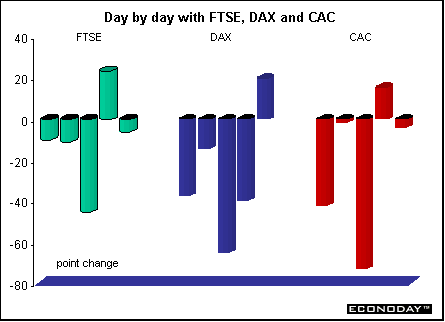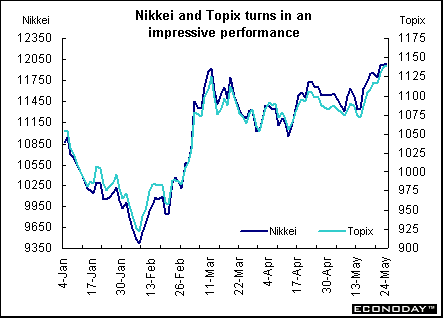Recap of global marketsEurope and BritainBritish and European equities indexes followed here continued to yo-yo — up one week and down the next. Over the longer term the ups and downs appear to be averaging out at least for the FTSE 100, which is basically where it was at the start of 2002. For the Frankfurt DAX and Paris CAC, the downside is taking its toll and both are lower than at the end of 2001. Terrorist threats spooked investors already uncertain about where their economies are really going. Thursday’s German GDP certainly didn’t help matters in the equities markets. Although the economy did not decline in the first quarter, it really didn’t grow either. French GDP, however, rebounded, while British growth limped along. On the week, the London FTSE 100, Paris CAC and Frankfurt DAX lost most of the previous week’s gains.  AsiaAsian markets except those in Japan also flagged last week and reversed the previous week’s gains. Japan is benefiting from a spate of optimism that its economy is at least bottoming out. In fact, the government has been very quick in announcing the improvement. The Bank of Japan corroborated the improvement in its monthly review. Among the indicators pointing to recovery are a pick up in exports, a recent slowing of the decline in industrial production and stabilization of deflation. While some analysts still have serious doubts about the country's economic prospects, many have begun to recommend that investors modestly increase their exposure to the country. The subtle change in attitude is significant, coming after more than a decade when most global equity allocation specialists have recommended being underweighted in Japan, often substantially.  Nevertheless, most Wall Street economists stress that the optimism is qualified: things can't get any worse, not that things are about to improve. Despite near-term stabilization, they argue that Japan's long-term growth prospects remain doubtful due to the economy's lingering structural problems, still not addressed by successive Japanese governments, and the keeping afloat of many uncompetitive Japanese companies. Yet as near-term market sentiment improves, overseas investors who had avoided Japan have been aggressively boosting their portfolio positions. Investors outside Japan were net buyers of equities for a fifth week, buying ¥322.3 billion more in shares than they sold in the five days from May 13 to May 17. That helped push the yen to a 5 1/2-month high last week. |
![[Back To Archive]](../../../images/backtoarchive.gif)